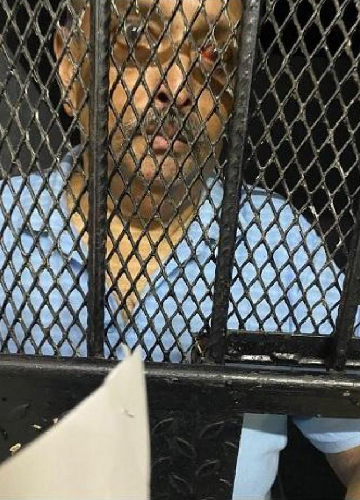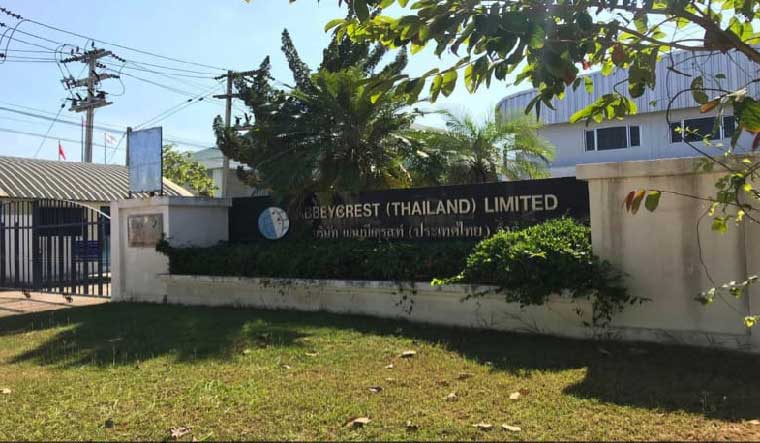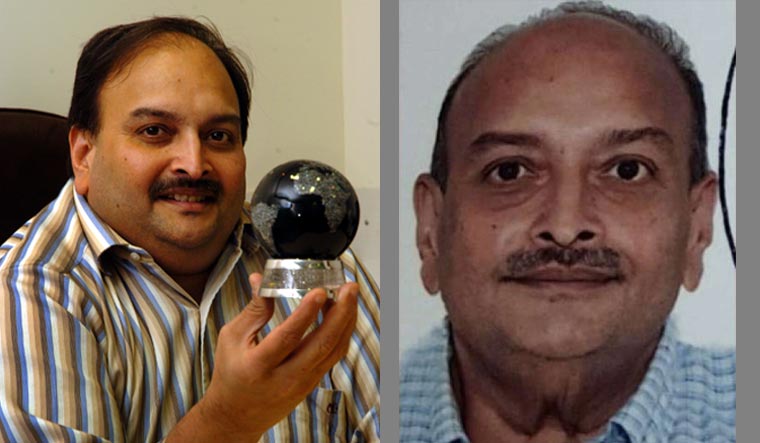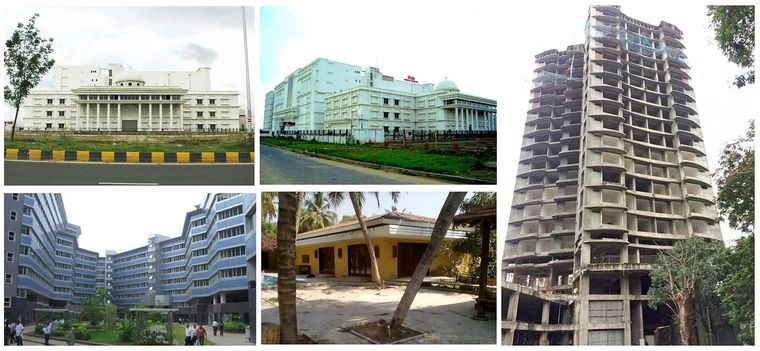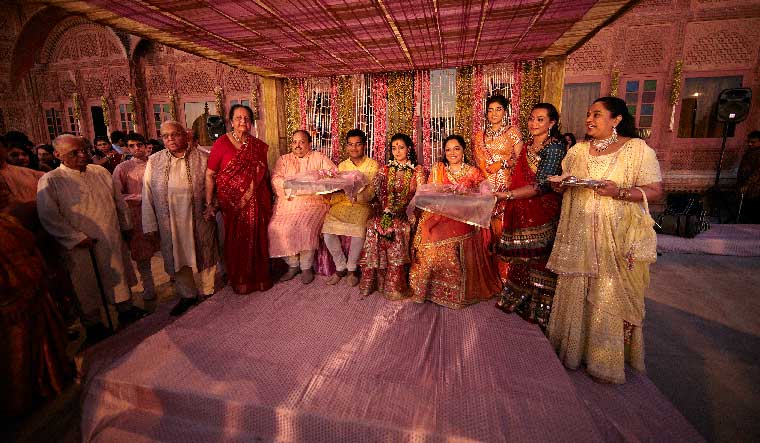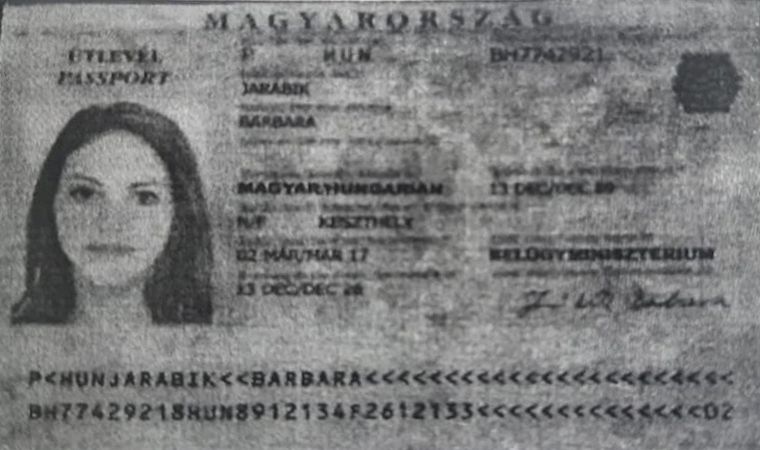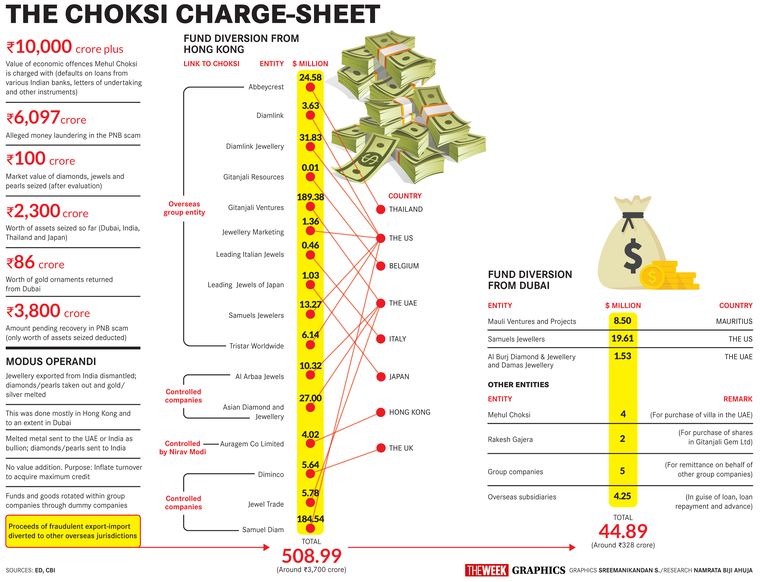A small team of Indian officials armed with documents visited Antigua and Barbuda in May and completed most of the paperwork for the deportation of fugitive diamantaire Mehul Choksi. The quiet visit was a precursor to the high-profile deportation Delhi had been planning for several months.
Choksi has a red corner notice against him, along with the multiple charges the Central Bureau of Investigation and the Enforcement Directorate have slapped on him.
Of late, India had seen more success in deportations compared with lengthy extradition proceedings, and the team visited to lay the groundwork for it. In any case, India does not have an extradition treaty with Antigua and Barbuda.
Officials in the know said that, by May, the diplomatic, legal and security concerns had been ironed out, and Choksi was supposed to be put on a commercial flight back to India. CBI Deputy Inspector General Sharda Raut—the investigating officer in the Punjab National Bank case, in which Choksi is an accused—was to produce him before a magistrate.
Deportation required political will, more than anything, and Antigua and Barbuda Prime Minister Gaston Browne was on board. “The Antiguan government took cognisance of all our concerns regarding the deportation,” said a senior government official. “All legal issues had been thrashed out.”
Delhi’s Covid-19 vaccine diplomacy had apparently made Browne more attentive to India’s concerns. It had also sparked hope of reviving the island nation’s economy ahead of its 40th independence day in November.
But that was not meant to be. India’s grand plans were scuppered. On May 23, Choksi vanished. He reappeared in Dominica two days later, bruised, battered and crying foul.
What started as a regular deportation by Antigua and Barbuda, considered Britain’s gateway to the Caribbean, soon turned into a cat and mouse chase across Caribbean waters.
On May 28, Delhi hurriedly dispatched a team of sleuths—led by Raut and foreign ministry officials—and put it on a private jet rented from Qatar. Commercial flights from Delhi to Antigua usually take more than 24 hours and Air Force flights could not be diverted; a logistically viable option was to hire a jet from Qatar, which has better connectivity, faster access and a fleet of private jets, said an official.
Top government sources said both Antigua and Dominican governments had given an in-principle assurance to India to deport Choksi. But after Choksi had landed in Dominica, differences had cropped up between certain agencies on whether a large CBI-ED team should be sent to press for deportation.
Finally, Raut, foreign ministry officials and officers of the CBI’s Interpol unit boarded the private jet to Dominica. There was no ED official on board even though it is the lead agency in the money laundering case in the Antiguan court. When contacted, ED officials said they had already sent bulk of their documents electronically. “In the normal course, only an officer or two are sent in a commercial flight to verify the arrest of a fugitive and brief the lawyers in another country,” said a former CBI director. He explained that a private jet, which costs a lot, would only be hired to send a large team of six to eight officials, after there is assurance by the host country that it will send the fugitive back.
“The RCN is an international warrant of arrest and requires the host country to facilitate it. That is the only way it is implemented,” said former CBI director A.P. Singh.
The bigger question is, who botched India’s plans?
Sleuths in Delhi suspect that certain powerful elements in the Caribbean islands leaked the information of Choksi’s deportation from Antigua and landed him in the Dominican police net. Choksi was allegedly in touch with some “external elements” who brought him to Dominica to “save him” from being deported to India.
He was allegedly offered a deal and a big “political” name was dropped. Choksi apparently took the bait. When the Dominican police got a whiff of his unauthorised presence on its soil, he was immediately picked up.
It is learnt that a local reporter, on his usual rounds, had visited the police station where he was told of a passport-less Indian in custody. As news broke, Choksi’s family and lawyers were alerted.
All hell broke loose. Browne claimed Choksi had gone to Dominica with his girlfriend to have a good time and should be deported to India. But Choksi, in his complaint to the Antigua police, claimed that he was kidnapped, beaten, blindfolded and put on the boat to Dominica by force.
In his five-page letter to the Antiguan police, accessed through his lawyer Vijay Aggarwal, Choksi said his kidnappers were “muscle men”, including two from India, who assaulted him when he had gone to meet his female friend Barbara Jarabik on the evening of May 23. He was put on a boat at Jolly Harbour with Barbara and two other passengers—Gurjit Bhandal and Gurmit Singh.
Aggarwal said they were suspected mercenaries who plotted to kidnap Choksi and deport him. While Gurmit is apparently an Indian national, Gurjit is said to be a UK citizen. But there is no confirmation of their antecedents either by the government or Choksi’s legal team.
The alleged role of “external elements” trying to stage Choksi’s exit from Antigua to Dominica for speedy deportation to India has added spice to the Caribbean chase.
The Choksi camp has alleged that two UK nationals were behind his mysterious landing in Dominica, and that the whole chain of events was part of an intelligence-led operation. The family is learnt to have hired a lawyer to take up the issue with Scotland Yard. Indian intelligence officials dismissed the allegation.
“Choksi cannot be brought to India by boat from the West Indies,” said a senior intelligence official. “Due process has to be followed to get him to India as he is a wanted man here. When he is produced in court, the agencies have to tell the court from where they got him.”
But Choksi’s legal team has already fanned out in the UK to draw international attention to the alleged human rights violations. Speaking to THE WEEK from London, Toby Cadman, cofounder of the Guernica 37 International Justice Chambers, said: “I am not in a position to confirm or deny what happened in Antigua, but if it is established that there was an attempt to unlawfully deport Mehul Choksi to India, then it is a matter that will need to be fully investigated with those responsible being held accountable.”
Incidentally, Cadman is representing UK national Christian Michel, who is in Tihar jail in the politically sensitive AgustaWestland case, and has already petitioned the UN Working Group on Arbitrary Detention on Michel’s behalf. Cadman claimed that Michel’s deportation from the UAE was a “quid pro quo” for Indian agencies’ assistance in sending Princess Latifa back to the UAE in 2018. “It is deplorable. It demonstrates that there is no commitment to the rule of law,” he said.
A senior security official said attempts were being made to discredit Indian investigating agencies, which have been successfully getting fugitives deported in the past few years. “Our worry is that Choksi will try to escape deportation using such allegations and counter-allegations to his advantage,” the official said.
Meanwhile, Barbara’s alleged presence on the boat and her emergence on television screens—saying Choksi was wooing her with gifts—has left his wife, Priti, distraught. “I was not his girlfriend and he is not my sugar daddy,” Barbara told a news agency. “I have my own income and business. I do not need his cash, support, hotel bookings or fake jewellery.”
Priti said she did not doubt her husband’s intentions, and that she wanted him to be returned to Antigua immediately. In fact, she told THE WEEK that she was waiting to celebrate her 35th wedding anniversary this December.
“I never claimed my husband was honey-trapped,” she said. “Barbara was just an acquaintance he walked with.”
Barbara’s comments have shifted the focus from the boat ride to Choksi’s alleged dalliances. This has not only thickened the plot, but has also put Priti in a spot. Was she unaware of the alleged relations or did she turn a blind eye to them?
According to investigators, Priti had divorced Choksi in 2012-13. The ED has recorded statements of Choksi’s friends and business associates, who said he told them at various functions that he was divorced. Priti, however, dismissed these claims.
She also said she would write to the Queen, who is the constitutional monarch and head of state. A 2018 constitutional referendum in Antigua had failed to pass an amendment replacing the London-based Judicial Committee of the Privy Council with the Caribbean Court of Justice as the final court of appeal.
Choksi’s marital status is of special interest to investigators. If he is indeed divorced, said an official, then any assets he might have transferred to Priti cannot be confiscated. Priti has been living with Choksi in Antigua since 2018; he had left India days before the CBI filed a first investigation report in the PNB case.
Currently, the ED is waiting for the Bombay High Court to declare Choksi a fugitive economic offender under the FEO Act 2018. This will allow the ED to confiscate his assets abroad.
In other problems for the investigators, the week-long stay in Dominica made CBI officers realise that institutional mechanisms were far too complex in the Caribbean countries. They had numerous meetings with Dominican authorities and made several calls to senior officials in Delhi for clarifications and advice. “The courts can play spoiler even if a country gives an in-principle approval to deport an individual. The Antigua or Dominican court is no different from a UK court,” said a senior CBI official who has also been handling Nirav Modi’s case in London’s Westminster court. Modi is a prime accused in the PNB scam along with his uncle Choksi.
Also read
- Yoga, meditation, clean personal space, exercise and recreation...: What Mehul Choksi will get in Mumbai Central Prison
- PNB fraud case: Nirav Modi’s brother Nehal arrested in US after India's extradition request
- 'Forcibly removed from Antigua', says Choksi after Dominica drops illegal entry charges
- Approached UK police to investigate Choksi’s arrest, torture: Lawyers
- Mehul met Barbara for dinner the day he disappeared: Choksi's wife
- Extradition law in England is complex
Had the Dominican court ordered Choksi’s deportation, he would have been in India by now, the official added.
In such cases, a combination of diplomatic heft, tact, pressure and smooth coordination comes in handy. But this seemed to be missing.
An investigator said that both Browne and Dominican Prime Minister Roosevelt Skerrit had been saying one thing, but doing another.
Skerrit had called Choksi an “Indian citizen”, but said the courts would decide the next course of action. Clearly, Dominica can neither keep Choksi for long nor send him back to Antigua, which has refused him entry.
There are local compulsions, too. Skerrit is battling to keep his position intact, even if it means making India wait a bit longer. He can ill-afford to be held responsible for Dominica’s “deteriorating international image”. Opposition leader Lennox Linton has alleged that the Dominican government knew Choksi was coming there and accused Skerrit of being involved in an “organised crime” and conspiracy.
Also, Choksi’s lawyer in Dominica, Wayne Norde, countered the CBI’s plea for deportation by saying that the Dominican court could decide only on the illegal entry of Choksi into the country, and not on his deportation. Norde also sought bail for his client, but the state attorney Sherma Dalrymple called Choksi a flight risk. The court in Roseau has adjourned the matter till July 14.
Another obstacle for India is the clout of diamond trader Chetan Choksi, who is watching over his brother in both Dominica and Antigua. The brothers had allegedly invested a lot in Antigua to get Choksi citizenship in 2017. Sleuths are wary of Chetan trying to stoke political fires till the time Choksi’s deportation becomes a political hot potato. Aggarwal, however, denied that Chetan was using his money power to save his older brother.
A senior law ministry official said Choksi’s stay in the Caribbean would become untenable if the Antiguan court throws out his appeal against the national government’s decision to cancel his citizenship.
What legal route the Antiguan government takes in the coming days will be crucial for India. And this depends heavily on what Steadroy Olivero Benjamin, Antigua’s attorney general and minister of legal affairs, has to say. India is using legal eagles such as senior advocate Harish Salve to fight its case in Dominica. “We will get Choksi in weeks, not months,” he said.
When the Indian team left Dominica on June 3, both Browne and Skeritt once again said Choksi could be deported to India.
But the return of the empty jet has left some higher-ups red-faced. The diplomats who underestimated the politics of the small island nations, and the Choksis’ influence, have become more circumspect.
Each arm of the Indian government is now treading with caution, listening to the others more intently. “In some ways, it had become a case where the right hand did not know what the left hand was doing,” said a senior investigator.
A glaring example was the citizenship issue. Choksi claimed to have surrendered his Indian passport after he fled in January 2018. The same year, the foreign ministry said that Choksi could not have dual citizenship and revoked his passport, setting off speculation whether he was no longer an Indian citizen. His lawyers have used this argument.
The CBI and the ED, however, have said that Choksi is still an Indian citizen. “In sensitive matters that are under investigation, no statement by any other agency should be given. Section 8 of the Citizenship Act, read along with the rules, lays down the procedure to renounce citizenship,” said an investigator.
Just because a fugitive takes citizenship of another country, he cannot throw away his Indian passport. According to the investigators, Choksi has not followed the due process of renouncing citizenship.
But Choksi was never a stickler for rules. An investigator recalled how Choksi had once called a famous singer to Dubai for a show. Instead of giving him his fee of Rs25 lakh, he gifted him a diamond necklace whose market value turned out to be less than Rs1 lakh.
In another instance, a model who ran away with his jewellery discovered that it was worth peanuts. ED investigations have found that Choksi used to procure artificial pearls in bulk from China, sold lab-grown diamonds as natural ones, painted crystals and sold them as coloured gems, and even sold second and third copies of watches for three times the original price.
Investigators said he also knew how to hide his money well. He rotated money using letters of undertaking and foreign letters of credit and also concealed these transactions through a web of shell companies and dummy directors.
And all the money, said investigators, was laundered to off-shore entities and later brought back into the legal system by buying properties or making investments in financial assets.
The ED charge-sheet mentions that Choksi had declared the stock value of his companies at Rs38,400 million, but following an independent valuation by the ED, the value was found to be Rs1,030 million.
In its charge-sheet, the ED has called Choksi the mastermind of a “behemoth scam”. “Not only was he proficient in hiding his money, but also in hiding from the law,” said a CBI officer.
Diplomats and investigators will be sitting together more in the coming months.
India has already begun gathering international support for the deportation of fugitives. “The accused take shelter in foreign countries and conceal the proceeds of crime in complex legal structures spread over different countries and jurisdictions,” Jitendra Singh, Union minister of state in the prime minister’s office, said while addressing the United Nations General Assembly in a special session on June 4. “Gaps and weaknesses of international cooperation in this area are fully exploited by such fugitives to their advantage.”
Over the years, the CBI has had a mixed experience in terms of cooperation by other countries. Some attempts, like the extradition of Ottavio Quattrocchi, wanted in the Bofors case, failed even after he was detained in Argentina.
Some other cases turned out to be false alarms. In 2011, a CBI team landed in Chile after it got information that IC814 hijacker Abdul Rauf had been detained there. The man turned out to be a Pakistani national with the same name and the CBI team returned empty handed.
But there are success stories, too. Like the deportation of Indian Mujahideen mastermind Yasin Bhatkal from Nepal in 2013; of Christian Michel from the UAE in 2018; and of underworld don Ravi Pujari from Senegal in 2020. Most of them claimed illegal detention, kidnapping and foul play in their deportation.
Some of these allegations form large portions of the appeals filed by their lawyers in courts and international justice forums. However, they continue to be behind bars.
Which category Choksi falls in remains to be seen. For now, the 63-year-old is spending time between police lockups, courts and the Dominica China Friendship Hospital, where he is being treated for his injuries.



